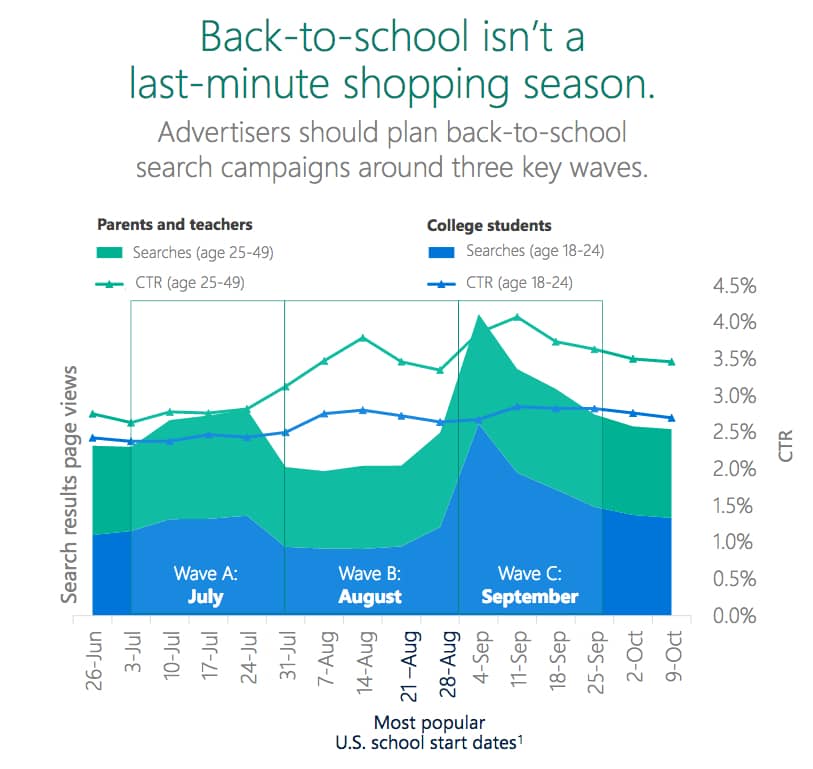Back-to-school shopping season is a busy and exciting time for retailers. It is the second largest retail spending holiday for online and in-store and contributes to 17 percent of the total year sales. In 2016, consumer spending on back-to-school products was a whopping $75.8 billion.
The opportunities for retail sales lie in both the K-12 group and the college students, with the college students spending more.
Many shoppers will be searching online and buying online or offline based on what they discover. Are your paid search campaigns ready for the upcoming boom?
It’s not too late to get started or fine-tune your back-to-school PPC strategy! Using the latest research, you can optimize campaign targeting, ad messaging, and bids to reach the buyers who are spending and adjust the timing to reach them.
1. Consumer Spending
Spending on back-to-school items is compulsory, not a discretionary cost, and it really adds up. According to the National Retail Federation, families with kids in grades K-12 family spend about $674 on items such as clothing, electronics, shoes, and school supplies.
As an example, the average family with K-12 students will spend $108 on school supplies, $126 on new kicks, and more.
College is a bigger cost investment in supplies overall, but they will tend to spend, for example, $211 on electronics and $114 on dorm furnishings.
With costs adding up, parents are even asking their kids to contribute the schools supplies costs. Pre-teens are spending on average $20 of their own money and teens spending $33.
2. Shopping List
With back-to-school spending being required to buy classroom supplies, shoppers are looking for deals and best prices on everything from tablets to T-shirts.
K-12 themed searches are focused on school supplies, shoes, clothing, and electronics.
College students are searching for furniture, kitchen accessories, bedding, home office furniture, and apparel.
3. Purchase Timing
Back-to-school search starts to peak as early as June and July and runs into September. There are three key periods to watch:
- July: Searches ramp up quickly and peak across all groups. 4.49% peak CTR, with pens, pencils, and markers having the highest CTRs for K-12.
- August: Search volume dips, but CTRs increase for teachers and parents who have deadlines to purchase supplies.
- September: Searches peak again as college students arrive on campuses. Average CTR spikes the week of September 18 at 2.32 percent. Online marketing can lead to offline sales.

4. Search Trends
Bing Ads has used Microsoft internal data to analyze the top back-to-school search volume for clothing, backpacks, laptops and tablets, cellphones, shoes, school supplies, and furniture for branded and non-branded search terms.
For example, 81% of school supplies searches are non-branded like “calculator”, “graph paper”, or “pencil pouch”.
In this product category, allocate more budget towards non-branded terms. For keyword match type, consider broad match modifier since non-brand searches alternate by variations of a keyword (e.g., “pen” rather than “Bic pen”).
5. Consumer Demographics
Back-to-school shoppers include parents, teachers, and college students themselves.
-
- 63 percent are of shoppers are aged 35 to 64.
- 32 percent of the searchers are 35 to 49 and half male and female.
- PreK-8 is the largest group of students.
- Majority of enrolled college students are female.
Your Action Plan
Here’s your plan for A+ back-to-school PPC campaigns this year:
- July: Branding and awareness initiatives will keep your products in the consideration set in the next few weeks as researching begins and peaks. Work on building remarketing lists on the back-to-school products and topics. Early on, identify products categories and optimize them in your shopping campaigns.
- August: Bid adjustments will help to maximize opportunities during this narrow time period of high volume searches. Increase bids on highest converting keywords, and cart abandoners. Think about reducing bids on those who have already purchased.
- September: Focus on college age. Shoppers shift a bit here since college students are buying when they arrive on campus. Consider increasing bids and budgets on college products and reducing budget allotment to the K-12 audience.
Also, consider the following:
- The time period to capitalize on this shopping holiday is tight, so be ready to have agile and responsive strategies.
- Understand the searcher and their needs in order to meet them.
- Adjust budgets for key time periods and expect increased CPCs during seasonal peaks.
- Offer deals or specials to be competitive.
- Prep your shopping campaigns with higher bids on more popular product categories.
Happy shopping!
Images and Data: Bing Ads advertising insights report





![AI Overviews: We Reverse-Engineered Them So You Don't Have To [+ What You Need To Do Next]](https://www.searchenginejournal.com/wp-content/uploads/2025/04/sidebar1x-455.png)